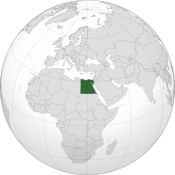Egyptian voters approve constitutional changes
Tuesday, March 22, 2011

In a referendum held Saturday, Egyptians voted overwhelmingly to amend the nation's constitution immediately, moving Egypt closer to a democracy, according to results announced today.
Electoral officials said 77% of voters endorsed a set of constitutional amendments that included limiting presidential terms, removing limitations on forming political parties, and holding a general election within six months.
Many of the mostly secular protest leaders who headed the revolution leading to President Hosni Mubarak's resignation were opposed to the amendments, not wanting to hold elections so quickly. Mohamed ElBaradei, winner of the Nobel Peace Prize, said the nation needed more political maturity before holding elections so soon. Leaders of Egypt's Coptic Orthodox Church also were against the amendments.
The Muslim Brotherhood, an Islamist group previously banned under Mubarak's rule, and the National Democratic Party, Mubarak's ruling party, were almost alone in supporting the amendments. Each hoped that its strong organization would give it an advantage in electing the parliament members who will write the new constitution.
Approximately 18 million people, 41% of those eligible, voted, according to electoral officials. This is in contrast to parliamentary elections held four months ago, when the turnout was only six million.
Although there were some problems at the voting places, observers said these were mostly due to the military's hasty preparations, not wrongdoing by officials. Opposition leader Mohammed ElBaradei was prevented from voting by men throwing stones in the worst incidence of sporadic violence.
The results were met with jubilation by Egyptians; in Cairo, horns were honked and fireworks set off. The elections are considered the first in decades not rigged in favor of one party.
"It's not important what the result is, it's important that it was fair," said a revolutionary leader, Abdul Rahman Yusuf.
Sister links
Sources
- Jeffrey Fleishman and Amro Hassan. "Egyptians overwhelmingly approve constitutional changes" — Los Angeles Times, March 20, 2011
- Matthew Rosenberg and Matt Bradley. "Egyptians Vote to Accept Changes to Constitution" — The Wall Street Journal, March 20, 2011
- Hannah Allam. "Egyptians vote for changes that will speed elections" — McClatchy, March 20, 2011

